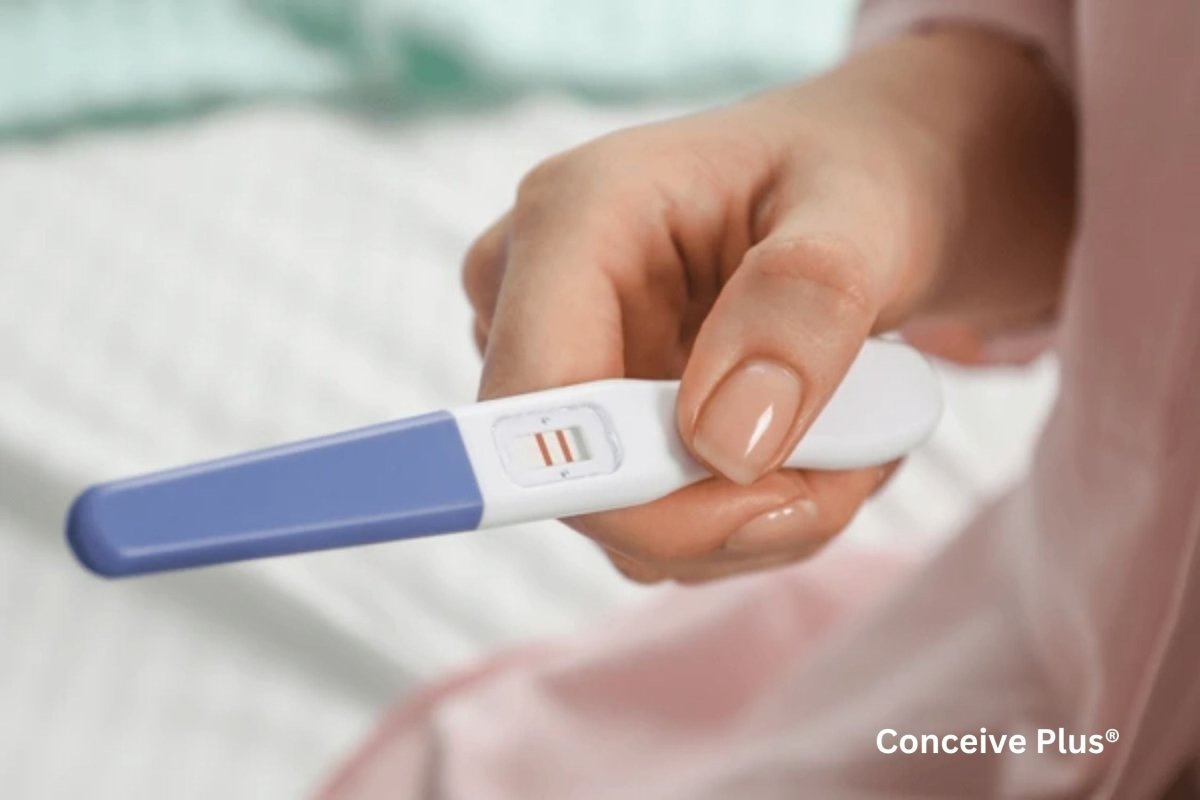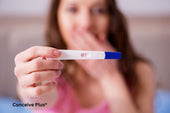Is It Possible to Get Pregnant After Abortion?

Abortion is a medical procedure that involves the use of medicines or surgery to end or terminate a pregnancy. It is a personal decision for any woman, which they can make based on several factors.
However, after an abortion, many women wonder about their ability to conceive again. Questions like, does abortion affect fertility or does abortion affect future pregnancy are common among women who opt for abortion.
If you are one of them, the good news is that after abortion pregnancy is possible [1]. Your body recovers quickly after an abortion, and it usually does not have a lasting effect on fertility. In this article, we will explore the impacts of abortion on female fertility health and her chances of getting pregnant after abortion. The article also includes some effective tips to boost fertility health after an abortion.
Types of Abortion
There are two main types of abortion: medical abortion and surgical abortion. The method used depends on several factors, such as the duration of pregnancy, your personal preference, and medical considerations.
-
Medical Abortion
This method of abortion involves taking medication, also known as abortion pills, to end a pregnancy [2]. Doctors recommend this method for pregnancies up to 10 weeks. The most common medications used are mifepristone and misoprostol [3].
Mifepristone blocks pregnancy hormones, while misoprostol causes the uterus to contract and expel the pregnancy. Medical abortion is usually a safer and more effective option compared to surgical methods because of the low risk of complications.
-
Surgical Abortion
A surgical abortion is a procedure performed by a doctor to remove the pregnancy from the uterus. There are different types of surgical abortion, and suction aspiration is the most common for early pregnancies [4]. This procedure involves the use of gentle suction to remove pregnancy tissue.
However, for the later stages of pregnancy, doctors use the dilation and evacuation (D&E) method [5]. This method involves dilating the cervix and removing the pregnancy with surgical instruments.
Fertility After Abortion
Since abortion directly involves the female reproductive system, whether you opt for the surgical method or medications, it raises concerns about fertility health. When planning for abortion, the first question that most women ask is, do abortions affect fertility, or do abortions reduce fertility?
The answer is that, in most cases, abortion does not cause long-term damage to your fertility health [1]. A safe medical or surgical abortion does not impact a woman’s ability to conceive unless complications such as infections or uterine scarring occur. Proper medical care and follow-up can prevent such complications and support reproductive health.
How Soon Can You Get Pregnant After Abortion?
Now you know that abortion doesn't have a long-term impact on fertility health, you may wonder how soon after an abortion can you get pregnant? or after an abortion when can you get pregnant?
Many different studies show that a woman ovulates after three weeks of an abortion [6]. Since ovulation means a mature egg is available for fertilization, a pregnancy can happen immediately. This short duration is the reason why some women find themselves unexpectedly pregnant after abortion if they do not use contraception.
However, it is important to understand here that your body needs time to recover to be able to support a healthy pregnancy again. If you are someone planning to conceive after an abortion, experts recommend waiting until the body fully recovers from the harm of abortion. However, there is no strict rule, and many women successfully conceive soon after an abortion without complications.
When Do You Ovulate After Abortion?
During pregnancy, the body does not release eggs, and ovulation stops completely. This happens because pregnancy hormones, especially progesterone and hCG, prevent the ovaries from producing new eggs [7]. Soon after abortion, the progesterone and hCG levels start to drop and signal the body to start the menstrual cycle again.
So the answer to questions like, when do you ovulate after an abortion or how do you calculate ovulation after abortion is that ovulation returns within 2 to 4 weeks after the abortion procedure. Reports show that 3 weeks is the average duration it takes before a woman starts to experience the signs of ovulation after abortion [6].
Signs of Ovulation After Abortion
Identifying the signs of ovulation after abortion or using ovulation after abortion calculator can help you determine the best time to conceive. Common signs of ovulation include:
- Increased cervical mucus
- Mild pelvic pain or cramps
- Changes in basal body temperature
- Increased libido
- Breast tenderness
You can track ovulation and your fertility window — when chances of conception are maximum — through these signs. In addition to these signs, you can also use tools like ovulation detection kits to identify your most fertile days.
Chances of Getting Pregnant After Abortion
Women opting for abortion often ask, can you get pregnant after abortion or can you get pregnant after an abortion? The answer is yes. If your body resumes ovulation and unprotected intercourse occurs, conception is possible. Women after report, I got pregnant 2 weeks after abortion, or I got pregnant right after abortion.
But, can you get pregnant right after an abortion?
The chances of getting pregnant 2 weeks after abortion are significantly higher as ovulation usually resumes by that time. Understanding how much sperm it takes to get pregnant can also help you better plan for conception after an abortion, as timing and fertility health play crucial roles in successful pregnancy. Since sperm can live in the reproductive tract for about 5 days, conception is possible if you plan intercourse anytime one week of abortion.
Signs of Pregnancy After Abortion
It is important to recognize the signs of pregnancy after an abortion. Since menstrual cycles may be irregular for a short time post-abortion, many women overlook the early pregnancy signs. The following signs are an indication that you might be pregnant:
- Missed periods
- Nausea and vomiting
- Fatigue
- Breast tenderness
- Frequent urination
- Food cravings or aversions
- Mood swings
- Implantation bleeding
If you start to notice such signs, it is a good idea to take a home pregnancy test to clear the doubts. If you need a reliable pregnancy test kit, you can try the Pregnancy Test Kit. It provides results with up to 99% accuracy, helping you check for pregnancy with confidence.
Does Abortion Affect Future Pregnancies?
While abortion doesn't significantly impact your ability to conceive, many women worry that it influences pregnant life in the future by any means. This raises a common question: does abortion affect future pregnancy?
Generally, if you had a safe abortion, it would not affect future pregnancies. However, if you experience complications of abortion, such as infections or uterine scarring, that may pose a risk to pregnancy health [8]. You must follow regular check-ups after abortion and during the next pregnancy to detect such risks early on and get proper medical care.
Boosting Fertility Health after Abortion
Taking care of your fertility health can improve your chances of conceiving and support a healthy pregnancy after an abortion. Here are some ways to boost fertility naturally:
-
Eat a Nutrient-Rich Diet
A balanced diet is strongly associated with female reproductive health. Foods rich in vitamins and minerals, such as leafy greens, fruits, nuts, and whole grains, support hormonal balance and overall fertility health. Nutrients like folic acid, iron, and omega-3 fatty acids are important for fertility health, especially when you are pregnant.
-
Consider Fertility Supplements
Female fertility supplements can help fill the nutritional gaps in your diet and avoid the risk of nutritional deficiencies. These supplements are effective in regulating the menstrual cycle, formation of healthy eggs, and improving hormonal imbalances.
Women’s Fertility Support and Ovulation Support by Conceive Plus are the two well-reputed fertility supplements for women. More than a hundred clinicians have recommended these supplements on FrontrowMD, highlighting their effectiveness and quality.
-
Maintain a Healthy Weight
Being underweight or overweight can affect ovulation and fertility. Excess body fat may lead to hormonal imbalances while being too thin can disrupt menstrual cycles.
You can maintain a healthy weight through a balanced diet and regular exercise to improve fertility health. If needed, consult a healthcare professional for guidance on achieving a weight that supports reproductive health.
-
Stay Active but Avoid Over-Exercising
Regular exercise can support your fertility health by helping you maintain a healthy weight and reducing stress. Moderate physical activities such as walking, swimming, or light strength training can be beneficial for your reproductive health and functioning.
However, studies show that excessive high-intensity workouts can disrupt ovulation and overall menstrual cycle [9]. It can especially be harmful for women who had an abortion previously. You must consult a specialist to find a balanced exercise routine that promotes overall well-being without putting too much strain on the body.
-
Avoid Harmful Substances
Smoking, alcohol, and excessive caffeine can harm your fertility health. Smoking reduces egg quality and can cause early menopause. Alcohol can interfere with hormonal balance, making it harder to conceive.
High caffeine intake is also negatively associated with female fertility health, so limiting coffee and energy drinks can be beneficial. Avoiding these substances can improve reproductive health and increase the chances of a successful pregnancy after abortion.
The Bottom Line
Pregnancy after abortion is entirely possible, as there are no significant side effects of abortion on female fertility health. Women who ask, can I get pregnant after abortion or can you get pregnant after an abortion should know that ovulation can resume as early as two weeks post-abortion.
At this time, it is essential to look for signs of ovulation and plan intercourse accordingly for maximum chances of pregnancy. Once you start to experience the signs of early pregnancy, take a pregnancy test to confirm the pregnancy and opt for prenatal care.
FAQs
-
How long after abortion can you get pregnant?
Women opting for abortion usually ask questions like, how long after an abortion can you get pregnant or how soon can u get pregnant after an abortion. Generally, ovulation occurs within 2 to 4 weeks after abortion and thus, you can get pregnant within this duration.
-
Can abortion cause complications in future pregnancies?
Normally, a safe abortion does not cause future pregnancy complications. However, in rare cases, infections or scarring can increase the risk of issues like preterm birth in future pregnancies.
Resources Used
- Elective abortion: Does it affect subsequent pregnancies? (n.d.). Mayo Clinic. https://www.mayoclinic.org/healthy-lifestyle/getting-pregnant/expert-answers/abortion/faq-20058551
- Redford, G. (2024, June 13). What is medication abortion? Your questions answered. AAMC. https://www.aamc.org/news/what-medication-abortion-your-questions-answered
- MacNaughton, H., Nothnagle, M., & Early, J. (2021, April 15). Mifepristone and misoprostol for early pregnancy loss and medication abortion. AAFP. https://www.aafp.org/pubs/afp/issues/2021/0415/p473.html
- Dean, G., Colarossi, L., Porsch, L., Betancourt, G., Jacobs, A., & Paul, M. E. (2015). Manual compared with electric vacuum aspiration for abortion at less than 6 weeks of gestation. Obstetrics and Gynecology, 125(5), 1121–1129. https://doi.org/10.1097/aog.0000000000000787
- BPAS. (n.d.). Dilatation and evacuation | Surgical Abortion. https://www.bpas.org/abortion-care/abortion-treatments/surgical-abortion/dilatation-and-evacuation/
- Schreiber, C. A., Sober, S., Ratcliffe, S., & Creinin, M. D. (2011). Ovulation resumption after medical abortion with mifepristone and misoprostol. Contraception, 84(3), 230–233. https://doi.org/10.1016/j.contraception.2011.01.013
- Professional, C. C. M. (2024b, May 1). Human chorionic gonadotropin. Cleveland Clinic. https://my.clevelandclinic.org/health/articles/22489-human-chorionic-gonadotropin
- Sajadi-Ernazarova, K. R., & Martinez, C. L. (2023). Abortion complications. In StatPearls. StatPearls Publishing. Retrieved from https://www.ncbi.nlm.nih.gov/books/NBK430793/
- Hakimi, O., & Cameron, L. C. (2017). Effect of Exercise on Ovulation: A Systematic Review. Sports medicine (Auckland, N.Z.), 47(8), 1555–1567. https://doi.org/10.1007/s40279-016-0669-8



















